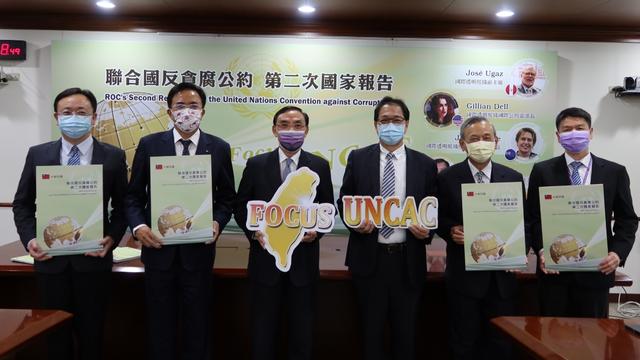Experts examined Taiwan’s compliance with the United Nations Convention Against Corruption. While their report was interesting, it omitted tax corruption and its impact on human rights.
by Massimo Introvigne

In 2003, the Uin 2003, the United Nations passed the UN Convention Against Corruption, the only universal legally binding anti-corruption instrument. For well-known reasons, Taiwan is not a member of the United Nations. However, similarly to what it did with the United Nations’ Two Covenants on Human Rights, which it incorporated into its domestic legislation in 2009, Taiwan unilaterally adopted the UN Convention Against Corruption in 2015. In that year, it passed the “United Nations Anti-Corruption Convention Implementation Act.”
It then established a system similar to the one it adopted for the Two Covenants. The government publishes periodically national reports about the implementation of the anti-corruption convention, and invites independent international experts to review them.
Concerning the anti-corruption convention, the first report was published and examined by the experts in 2018. The second was delayed by the COVID-19 crisis and was published on April 20, 2022. From August 30 to September 2, 2022, five experts were invited to Taiwan for onsite review. They were José Ugaz (Peru, chair), former chairperson of the NGO Transparency International; Gillian Dell (USA), Head of the Conventions Program at Transparency International; Julie Haggie (New Zealand), CEO of Transparency International New Zealand; Kim Geo-Sung (South Korea), former chairperson of Transparency International South Korea; and Peter Ritchie (Australia), Regional Anti-Corruption Adviser for the American Bar Association Rule of Law Initiative.
At the end of the public review, the five experts formulated three main recommendations. The first was that Taiwan should pass without delay the proposed Protection Law for Whistleblowers. The second was that corruption within private companies should also be tackled, by including anti-corruption provisions in the Company Law. The third is that political contributions by privates and by foreign entities should both be made transparent and limited. The experts noted that some of their recommendations had already been made when reviewing the 2018 report, and have not been implemented.
Taiwan has a notorious problem of corruption, and the experts’ recommendation are certainly important. On the other hand, one has the feeling that something is missing. The United Nations have increasingly emphasized in recent years the connection between corruption and the violation of human rights, including freedom of religion or belief.

Interestingly, exactly in the same days when the International Review Conference on the implementation of the Anti-Corruption Convention was taking place, another event was organized in Taiwan under the title “The 2022 Regional Religious Freedom Forum—An Indo-Pacific Civil Society Dialogue on Religious Freedom in Challenging Times.” It was inaugurated by President Tsai Ing-Wen and, not surprisingly, focused mostly on Mainland China. President Tsai stated that Taiwan “is committed to advance religious freedom at home and abroad.” However, domestic Taiwan problems were not discussed.
On February 28, 2022, at the 49th session of the United Nations Human Rights Council in Geneva, Switzerland, CAP-LC (Coordination des Associations et des Particuliers pour la Liberté de Conscience, Coordination of Associations and Individuals for Freedom of Conscience), an NGO in special consultative status with United Nations’ ECOSOC (Economic and Social Council), presented a written statement on “Corruption as a Tool for Human Rights Violations and Religious Liberty.”
Among the examples of how corruption is used to deny freedom of religion or belief to minority groups, CAP-LC mentioned the Tai Ji Men case in Taiwan. CAP-LC emphasized how filing against the Shifu (Grand Master) of Tai Ji Men, Dr. Hong Tao-Tze, politically motivated charges of fraud and tax evasion, recognized as false by courts of law up to Taiwan’s Supreme Court, continuing to harass the movement through tax bills, and illegally confiscating and seizing its property could not have happened without a massive amount of corruption within Taiwanese bureaucracy.
Virtually all scholars who have studied bureaucratic corruption have noted how this easily proliferates within tax offices, particularly those that, like Taiwan, reward officers who issue and enforce tax bills with a system of bonuses. In turn, among religious studies scholars, the Tai Ji Men cases is now one of the most studied and discussed in academic conferences internationally. Tai Ji Men sent a letter to the five experts not only on its own case, but on the massive incidence of corruption within Taiwan’s National Taxation Bureau and Administrative Enforcement Agency. An attempt by a Tai Ji Men representative to personally deliver the letter and supporting material to those attending the review meeting was blocked with some rudeness by officers from the conference.

By omitting a discussion of tax corruption and its effects on human rights, demonstrated by the internationally well-known Tai Ji Men case (and of course by other cases as well), the experts ignored the proverbial elephant in the room. They should nonetheless be thanked for pointing out that the UN Convention Against Corruption has not yet been fully implemented in Taiwan. But without a detailed examination of how corruption impacts human rights, including freedom of religion or belief, such reviews would always remain incomplete.
Source: Bitter Winter

